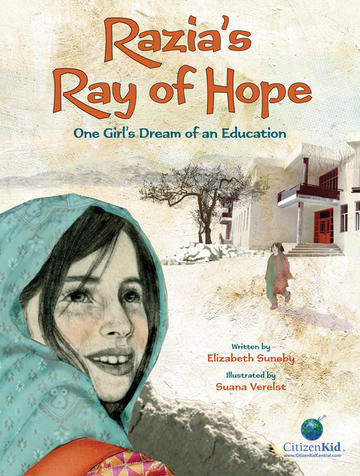 Enlarge Cover
Enlarge Cover
Razia is excited when her grandfather tells her there's a school for girls being built in their Afghan village. At last, girls will have the same opportunity to be educated as boys. “Every night I fell asleep dreaming about going to school like my brothers,” she says. Her grandfather wants Razia to enroll in the school. He remembers a time, before the wars and the Taliban, when educated women in Afghanistan became doctors, government workers and journalists, and how this made families and the country stronger. Razia knows, however, that she will need permission from her father and her oldest brother, Aziz, in order to be allowed to attend the school. She begs her grandfather, “Please, Baba gi, ask Baba and Aziz if I may go. I must go.” But will her grandfather's words be enough to convince the younger men of the value of an education for Razia? Inspired by real-life Razia Jan's experiences when she built the Zabuli Education Center outside of Kabul, Afghanistan, author Elizabeth Suneby uses a fictionalized story to deftly personalize the plight of many children around the world who are not being educated. The layered, mixed-media illustrations by Suana Verelst add contextual details about life in an Afghan village. This book works perfectly for a social studies lesson on global cultures. Extra resources include an overview of children worldwide who do not attend school, the story of the real Razia Jan, a glossary of Dari words found in the text and activity suggestions.
Elizabeth Suneby loves words! Writing helps Liz come up with new ideas, learn new things, figure out her feelings and express them to others. Writing is also how Liz earns a living. She writes content for companies large and small. She writes magazine articles. And she writes books for children and teens that help kids find their voice in a hopeful world.
Suana Verelst was born in Antwerp, Belgium, and grew up in Kortrijk, a Belgian town close to the French border. She studied drawing and painting at the Academy of Fine Arts in Sint-Niklaas, East Flanders, before leaving for Canada to continue her studies in Art History, Fine Arts and Graphic Design.
- Age:
- 8 to 12
- Grade:
- 3 to 7
- Reading age:
- 8 to 12
- Winner, CCBC Choices 2014, Cooperative Children's Book Center
- Winner, Best Books of the Year for Children and Young Adults, Bank Street Children's Book Committee
- Short-listed, Jane Addams Children's Book Award , Women's International League for Peace and Freedom
- Winner, Social Justice Literature Award, International Reading Association
- Commended, USBBY Outstanding International Book , International Board on Books for Young People (IBBY)
- Winner, Middle East Book Award, Picture Book, Middle East Outreach Council
- Winner, South Asia Book Award for Children's Literature, South Asia National Outreach Consortium
- Winner, White Raven List, International Youth Library
The back matter includes a list of classroom-friendly activities that should help teachers encourage readers to appreciate the literary, artistic, and historical elements of this book.
Purposeful in a positive way, this imaginatively illustrated book should open readers' eyes to issues facing children who live in very different circumstances.
This inspirational story is as beautifully illustrated as it is told. It is vital that young readers have stories like this one to show them that positive change is possible in the world, and that believing in yourself is the first step.
Buy this book at:
Buy the e-book:
Annotations
Razia'a Ray of Hope: One Girl’s Dream of an Education
Razia dreams of getting an education, but in her small village in Afghanistan, girls haven't been allowed to attend school for many years. When a new girls' school opens in the village, a determined Razia must convince her father and oldest brother that educating her would be best for her, their family and their community. Razia's Ray of Hope is the latest inspiring story from the CitizenKid™ collection.
This picture book is a good example of multicultural literature that gives voice to individuals whose stories are often overlooked. Razia is a strong-minded girl who, like millions of other children across the world, has not had the opportunity to go to school. This fictional story is based on the real stories of young Afghan women who are tenacious, who are fighting for equality, and who have never given up on hope.
Author available for class visits. @pressed4words
Source: Association of Canadian Publishers. Top Grade Selection 2016.




